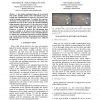Free Online Productivity Tools
i2Speak
i2Symbol
i2OCR
iTex2Img
iWeb2Print
iWeb2Shot
i2Type
iPdf2Split
iPdf2Merge
i2Bopomofo
i2Arabic
i2Style
i2Image
i2PDF
iLatex2Rtf
Sci2ools
126
click to vote
ICRA
2003
IEEE
2003
IEEE
Motion planning for multiple mobile robots using dynamic networks
- A new motion planning framework is presented that enables multiple mobile robots with limited ranges of sensing and communication to maneuver and achieve goals safely in dynamic environments. To combine the respective advantages of centralized and de-centralized planning, this framework is based on the concept of centralized planning within dynamic robot networks. As the robots move in their environment, localized robot groups form networks, within which world models and robot goals can be shared. Whenever a network is formed, new information then becomes available to all robots in this network. With this new information, each robot uses a fast, centralized planner to compute new coordinated trajectories on the fly. Planning over several robot networks is decentralized and distributed. Both simulated and real-robot experiments have validated the approach.
Related Content
| Added | 04 Jul 2010 |
| Updated | 04 Jul 2010 |
| Type | Conference |
| Year | 2003 |
| Where | ICRA |
| Authors | Christopher M. Clark, Stephen M. Rock, Jean-Claude Latombe |
Comments (0)

